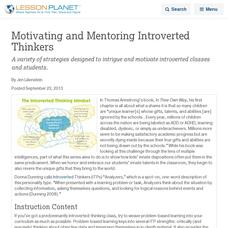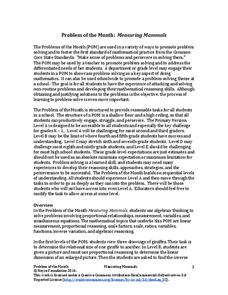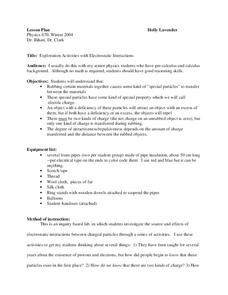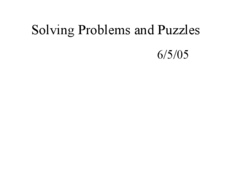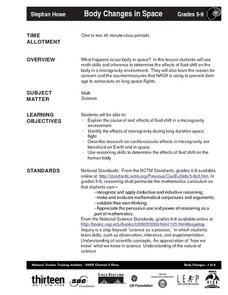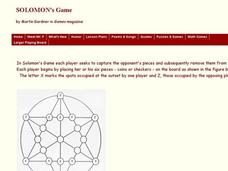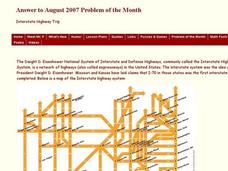Curated OER
Motivating and Mentoring Introverted Thinkers
A variety of strategies designed to intrigue and motivate introverted classes and students.
Shodor Education Foundation
Algorithm Discovery with Venn Diagrams
Here is a lesson that takes an interesting approach to analyzing data using box and whisker plots. By using an applet that dynamically generates Venn diagrams, the class forms a strategy/algorithm for guessing the rule that fits the...
Curated OER
Understanding the Influence of the Media
Critically analyze advertising techniques, such as circular reasoning, bandwagon, testimonial, and repetition, with worksheets that effectively discuss and illustrate how the media aims to influence.
Skyscraper Museum
Changes in a City Over Time
Investigate the growth and development of New York City with the final lesson in this four-part series on skyscrapers. Learners first explore the concept of urban growth by looking closely at a series of three paintings made of Wall...
Curated OER
Are We Alone
Seventh graders collect/analyze data and draw conclusions; support reasoning by using a variety of evidence; construct logical arguments; access information at remote sites using telecommunications; apply the concept of percent;...
Curated OER
Not So Snappy 14
In this word problem worksheet, students endeavor to logically discover the answers to some common-sense equations. Three out of four questions pertain to real-world situations with the fourth asking for number products.
Curated OER
Go-Togethers
In this math analogies worksheet, 3rd graders circle the appropriate multiple choice answer that best completes 6 math analogies. Students complete one analogy.
Noyce Foundation
The Shape of Things
Investigate the attributes of polygons. A thorough set of lessons presents problem scenarios for elementary through high school classes. The first lessons focus on basic characteristics of polygons, including the line of symmetry. As the...
Noyce Foundation
Cubism
If cubism were a religion, would you follow it? Lower-level tasks focus primarily on counting the number cubes in a structure and relating the number to surface area. As learners progress to higher-level tasks, isometric drawings and...
Noyce Foundation
Lyle's Triangles
Try five problems on triangles. Levels A and B focus on shapes that can be created from right triangles. Level C touches upon the relationship between the area of a six-pointed star and the area of each triangle of which it is composed....
Noyce Foundation
Piece it Together
Score some problems all related to soccer balls. The first few problems focus on pattern blocks to see relationships between figures. More advanced problems focus on actual soccer balls, the patterns on the balls, and their volumes and...
Noyce Foundation
Digging Dinosaurs
Build a function to solve problems rooted in archeology. A comprehensive set of five lessons presents problems requiring individuals to use functions. The initial lesson asks learners to find the possible number of dinosaurs from a...
Noyce Foundation
Measuring Mammals
Explore the meaning of scale and proportion with a set of five activities that examines the topic from elementary through high school. The first lessons explore ratio by examining pictures of different sizes. The next three activities...
Noyce Foundation
Double Down
Double the dog ears, double the fun. Five problems provide increasing challenges with non-linear growth. Topics include dog ears, family trees and population data, and geometric patterns.
Ohio State University
Exploration Activities with Electrostatic Interactions
Step out of the 21st century and discover protons and electrons through observation. Using common materials, participants continually adjust their explanation of charges. The final assessment requires pupils to design their own...
Curated OER
Lesson Plan 3: Great Book, Gross Book
It's time for your scholars to become book reviewers! Start with a fun review of foods: are they good or gross? Learners apply these evaluation techniques to books, recording their thoughts on large pieces of butcher paper. Simply have...
Curated OER
Solving Problems and Puzzles 1
Plug in this presentation for a quick start to your day. The class reviews the 6 times tables how they relate to division and then work through patterns to build logical reasoning and sequencing skills. A wonderful warm up or problem...
Curated OER
Sopay Water
Tenth graders design and conduct an experiment to explore the use of several substances in removing soap from water. During this activity they work with a lab partner. They keep their own individual lab notes, after they finish, they...
Curated OER
Performing a Play
Students discover logical deduction by participating in a play. In this reasoning lesson, students act as characters from a play who's words must be analyzed to see if they are true or not. Students perform parts of the play and...
Curated OER
Body Changes in Space
Learners explain the cause of and effects of fluid shift in a microgravity
environment. Students identify the effects of microgravity during long duration space flight. Learners describe research on cardiovascular effects in microgravity...
Curated OER
Four Color Map
Learners explore geometry by completing a color puzzle. In this shape identification lesson, students utilize deductive reasoning to complete a Google SketchUp puzzle with trapezoid, triangles and rectangular shapes. Learners complete...
Curated OER
Solomon's Game
In this algebra worksheet, students solve a word problem by playing a game of Solomon, where they capture their opponents piece and remove them from the game. There is one problem with answer key.
Curated OER
Interstate Highway Trip
In this algebra worksheet, 11th graders calculate a path taken without repeating and crossing the same path more than once. They are given clues to help-them find the right answer. There is a solution key with his word problem.
Community High School of Vermont
Habits of the Mind
An informative one-page resource details the 16 Habits of Mind. Habits encourage positive problem-solving, self-awareness, creativity, and dedication—lifelong skills that can be used in both academic and social settings.


